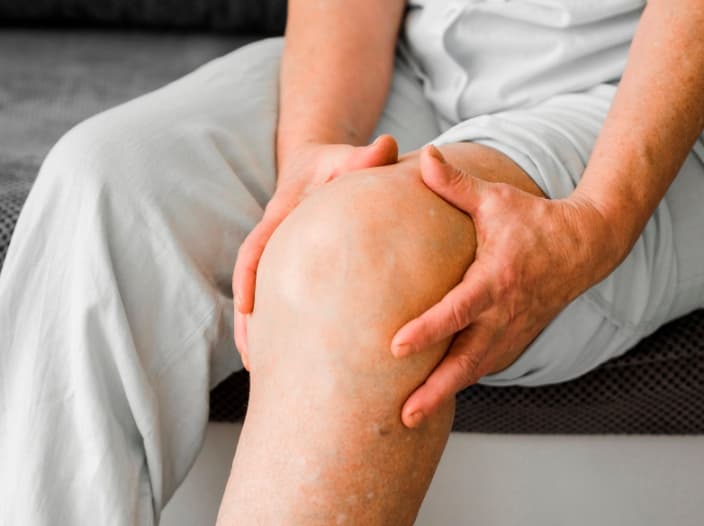How to Relieve Nerve Pain in Knee: Try These Effective Fixes
Have you ever felt a sharp, burning, or tingling pain in your knee? It might feel like your leg is zapping you. That pain could be from a nerve. Nerve pain in the knee can stop you from walking, running, or even sleeping well.
But don’t worry! There are easy ways to feel better. In this guide, we’ll show you simple steps to help relieve the pain. Let’s take it one step at a time and get your knee feeling better!
Table of Contents
What Could Lead to Knee Nerve Pain?
Nerve pain in the knee can happen for many reasons. It often feels like sharp, burning, or tingling pain. Here are some common causes:
Injury or Trauma
A fall, twist, or hard hit to the knee can damage nerves. For example, a sports injury might bruise or stretch the nerves around the knee. This can cause pain that feels like electric shocks.
Pinched nerve
Sometimes a nerve near your knee can get squeezed or pressed by muscles, bones, or swelling. This pressure makes the nerve send pain signals.
Sciatica
This is when the sciatic nerve, which runs from your lower back to your leg, gets irritated or pinched. A problem in your back, like a slipped disc, can send pain down to your knee. It might feel like a burning or shooting pain.
Medical Conditions
Some health problems can harm nerves. Diabetes is a big one, it can cause neuropathy, where nerves get damaged and cause pain or numbness. Arthritis in the knee can also irritate nerves by causing swelling or bone changes.
Poor Posture or Habits
Sitting cross-legged for too long or standing in one position can put stress on knee nerves. Wearing tight shoes or braces might also squeeze nerves, leading to discomfort.
Infections or Inflammation
Infections like shingles or inflammation from conditions like rheumatoid arthritis can affect nerves. This can make your knee feel painful or sensitive.
Signs and Symptoms of Nerve Pain in the Knee
Nerve pain feels different from other types of pain. If you have nerve pain in your knee, here are some signs to watch for:
- Sharp or Burning Pain: The pain might feel like an electric shock or burning. It can come and go or stay steady.
- Tingling or Pins and Needles: You might feel a tingly sensation, like when your foot falls asleep. This can spread around the knee.
- Numbness: Parts of your knee or leg might feel numb. You may not feel touch or pressure well.
- Weakness: Your knee might feel weak. It could be hard to bend or move it without feeling wobbly.
- Pain That Spreads: The pain might start in your knee but travel up to your thigh or down to your foot. This happens if nerves are irritated higher up, like in your back.
- Sensitivity: Your knee might feel extra sensitive. Even light touch, like clothes rubbing, can hurt.
How is Knee Nerve Pain Diagnosed?
Doctors use a few steps to figure out if you have nerve pain in your knee. They want to know what’s causing it. Here’s how they do it:
- Talking About Your Symptoms: The doctor will ask about your pain. They’ll want to know when it started, how it feels, and what makes it worse. For example, they might ask if you feel tingling or burning.
- Physical Exam: The doctor will check your knee. They might touch it, ask you to move it, or test your strength. They’ll look for signs like numbness or weakness.
- Nerve Tests: Special tests can check how your nerves are working. One test is called electromyography (EMG). It measures electrical signals in your muscles. Another test, a nerve conduction study, checks how fast signals move through your nerves.
- Imaging Tests: Doctors might use X-rays, an MRI, or a CT scan to look at your knee and nearby areas. These show if bones, tissues, or nerves are being pressed.
- Blood Tests: Sometimes, blood tests are done to check for conditions like diabetes or infections. These can cause nerve pain.
Treatment for Knee Nerve Pain
Treating nerve pain in the knee depends on what’s causing it. Doctors use different methods to help you feel better. Here are some common treatments:
- Rest and Activity Changes: Resting your knee can reduce pain. Avoid activities that make it worse, like running or sitting too long. Gentle movements may help keep your knee from getting stiff.
- Medications: Doctors might suggest pain relievers like ibuprofen to ease swelling and pain. For nerve pain, they may prescribe special medicines like gabapentin to calm the nerves.
- Physical Therapy: A physical therapist can teach you exercises to strengthen your knee. They might also use techniques like massage or stretches to reduce nerve pressure.
- Ice or Heat: Putting an ice pack on your knee can help with swelling. Heat can relax tight muscles. Try each for 15 minutes to see what works best.
- Braces or Supports: A knee brace can take pressure off nerves. It keeps your knee stable while it heals.
- Injections: For bad pain, doctors might give a shot of medicine, like a corticosteroid, to reduce swelling around the nerve.
- Treating the Cause: If something like diabetes or sciatica is causing the pain, doctors will treat that condition. For example, controlling blood sugar can help nerve pain.
Conclusion
Relieving nerve pain in the knee requires a combination of proper diagnosis, medication, physical therapy, home remedies, and, in some cases, advanced treatments. Long-term relief depends on addressing the underlying cause, supporting nerve health, and maintaining a lifestyle that prevents further nerve damage.
Reducing nerve pain, regaining mobility, and improving quality of life without exclusively depending on medicine or intrusive treatments is completely achievable by putting the aforementioned techniques into practice.
